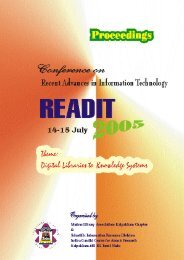READIT-2007 - Indira Gandhi Centre for Atomic Research
READIT-2007 - Indira Gandhi Centre for Atomic Research
READIT-2007 - Indira Gandhi Centre for Atomic Research
Create successful ePaper yourself
Turn your PDF publications into a flip-book with our unique Google optimized e-Paper software.
If our human filters are all too much like ourselves in background, if they are all<br />
saying the same sorts of things, then it may be time to risk indulging in a little<br />
overload. In addition to human filters, we also need to learn how to use the<br />
increasingly large and effective array of automated filtering tools. Search engines<br />
such as Google now make it possible, as a matter of routine, to winnow out billions of<br />
pages of irrelevant in<strong>for</strong>mation in an instant and to home in on the one or two pages<br />
that matter. Similarly, by carefully slicing, dicing and auto-filtering syndicated news<br />
feeds, it is now possible to set up highly focussed streams of incoming news tailored<br />
to one’s particular requirements.<br />
Second, we ourselves need to learn how to act as filters <strong>for</strong> others. Whether it<br />
is in the context of a money-making business or simply "<strong>for</strong> the good of the cause",<br />
central to what knowledge workers do is to collect and filter in<strong>for</strong>mation and pass it<br />
on to others as knowledge. Often, simply sorting bits of disconnected in<strong>for</strong>mation into<br />
commonly accepted (or novel) classification schemes already adds sufficient value to<br />
count as a desirable knowledge product. In other cases, we need to process the<br />
in<strong>for</strong>mation in more profound ways to make it into something that others will want to<br />
use in their own knowledge projects.<br />
Third, we need to keep up to date with new developments - tracking both<br />
broad political and technological trends and specific developments in particular fields<br />
of interest. This requires maintaining a constant watch on a variety of ‘popular’ and<br />
scholarly news sources - including academic journals, newsletters, weblogs and<br />
syndicated news feeds - and participating in networking events, such as conferences<br />
where in<strong>for</strong>mation about the latest advances (and the latest gossip) is exchanged.<br />
Fourth, we need to learn how to rapidly develop and deploy knowledge<br />
products be<strong>for</strong>e the window of opportunity within which they can be effective closes.<br />
While there will probably always be a market <strong>for</strong> painstaking empirical and<br />
theoretical work that unfolds over periods of many months and years, most often the<br />
type of knowledge that matters is that which can be brought to bear quickly. For<br />
example, the Slovenian philosopher Slavoj Zizek has in the last decade become one of<br />
the most influential and sought after cultural analysts in academia. In part he has<br />
achieved this status as a result of his closely argued and startlingly original academic<br />
writings ♣ , but in part it also results from the constant stream of almost instantaneous<br />
commentaries he provides (via magazines, newsletters, conference presentations,<br />
radio interviews and the like) on unfolding world events. To create and deploy<br />
knowledge quickly we need to learn the skills of rapid knowledge assembly, such as<br />
using ready-made components as building blocks <strong>for</strong> larger products, collaborating<br />
with others to make projects more manageable, and making use of techniques such as<br />
rapid prototyping (11) to speed development. We also need to learn to resist the<br />
temptation of ‘over engineering’ our products and to recognise when good enough is<br />
indeed good enough.<br />
Fifth, we have to become more skilled and strategic in managing time as the<br />
most valuable resource available to us. For some, this might mean careful project<br />
♣ Zizek, S. (1992). Enjoy Your Symptom! Jacques Lacan In Hollywood And Out.<br />
London: Routledge.<br />
Zizek, S. (2001). Did Somebody Say Totalitarianism? Five Essays in the (Mis)Use of<br />
a Notion. London: Verso.<br />
I-12

















